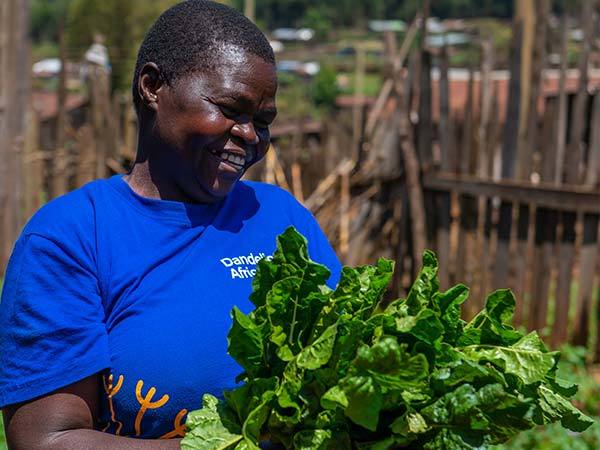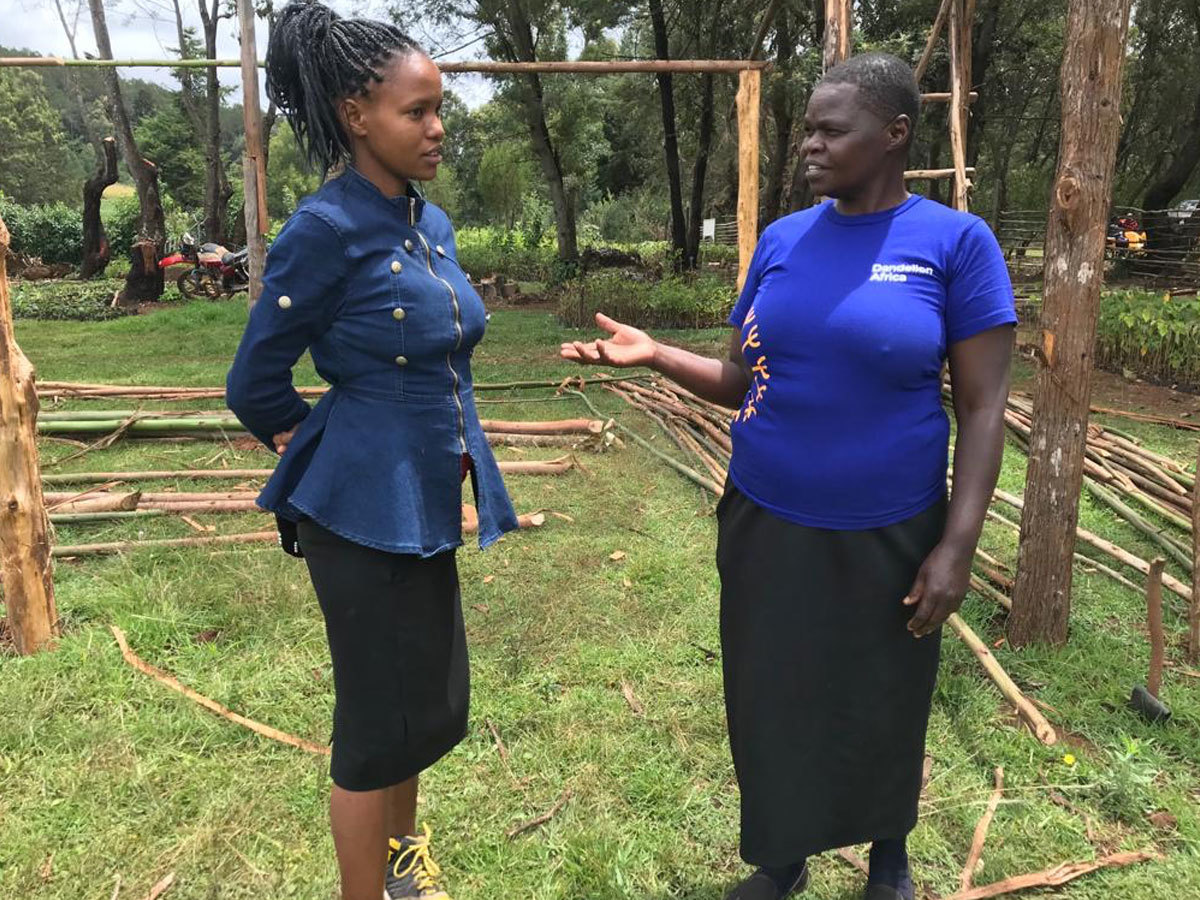
Community Health Worker, farmer and environmentalist
Regina helps in the maternity ward at the local hospital, and grows crops such as potatoes, cabbage, fruit, kale and spinach. She also farms pigs and opened a pig butchery with her husband in her village.
Apart from being a Community Health Worker, I also love farming. I grow crops and rear pigs. I like helping the needy in the community and occasionally I donate foodstuff to them. Farming also provides income for my family and offers us a balanced diet.
As a Community Health Worker, I act as the intermediary between health facilities and the community. My community are a long distance from facilities. I educate them about accessing free sexual and reproductive health services and information in Dandelion Africa’s safe spaces (rented rooms in villages) with the Backpack Nurse. I encourage women in our communities to join table banking (a local scheme for women to save money) and learn about entrepreneurship skills in order to start income generating activities. I also encourage them to plant trees and learn climate smart agriculture so as to build resilience to climate change.

Regina grows crops for her family and donates them to the community
“People in my community call me the village doctor. They even come to my home to look for me for sexual and reproductive health information. As a Community Health Worker I am trusted by the community to an extent of being asked about health issues which are beyond my knowledge.”
Regina is the key to people learning about their sexual and reproductive rights
Sexual and reproductive health and rights (SRHR) is important to me because over the 20 years as I worked as a nurse aide, I saw a number of young women and girls go through so many challenges because they did not have the correct information about their sexual and reproductive health options. The cost of obtaining the services were also too high for girls and young women living below the poverty line.
Regina takes any opportunity to speak to a variety of people about healthcare and SRHR.
When I go to my farm, I talk to women in their farms, at the river banks, in hotels and shops nearby. I partner with other CHWs to reach out to men and women and the youth on SRHR information in the hang out places like kinyozis (barbers), pool joints, video joints, churches and river banks. This has proved to be resourceful in getting many women of different walks of life and in different contexts. I normally liaise with our area chief so he can allocate a session for me during community barazas (public meeting places) to speak to community leaders. I use a variety of means to get around from walking when I don’t have money, to using motorbike transport, or Matatu.
Regina practices what she preaches at home
I enjoy taking care of my four children and being part of their lives, taking care of my family brings me so much joy and happiness. Being a CHW has enabled me to educate my young girls at home on not engaging in risky behaviour.
"For my young girls in primary school I encourage them to abstain from sexual intercourse. I encouraged the elder one to take up family planning. I have had to have conversations with my husband about our children’s welfare which was not easy at first, but he saw it was important to give SRHR information to our girls and boys".

After meeting Regina (right) in 2021, Alice (left) learned about family planning for the first time and decided to use contraception. She had dropped out of college after having her first child and gave birth to her second child shortly after. Thanks to Regina’s guidance and passion for supporting youth, Alice decided to join a local youth group run by Dandelion Africa. She now runs her own businesses to support her young family. In 2022 she trained to be a Youth Peer Mentor for Dandelion Africa and teaches other young women about SRHR.
Increasing awareness among young women
In our community there are a lot of myths about young women and girls taking up family planning. Such as it might cause barrenness, or disinterest in being intimate with your partner, it can cause cancer, it can cause you to have triplets or even more multiple sets if twins, or you will simply be seen as an immoral person. The strong patriarchal system hindering women’s exercise of bodily autonomy is also a challenge.
Regina has seen the change in her community’s attitudes towards SRHR
There has been an improved health seeking behaviour amongst my community due to the contact we have with them in their households, community dialogue forums, and action days (when Community Health Workers spend a day with the community members on activities identified by the community as priorities, such as clearing bushes, constructing a pit latrine or running an outreach). My community take time to adopt new ideas, but they eventually come around.
“It has taken quite some time to notice change, but I have seen how much the youth especially are adopting family planning. Others have even gone back to school. Mothers are now going for their full antenatal care visits, men are taking up more condoms. Young women and girls are no longer as shy in receiving referral forms from me. This is really encouraging.”
Regina shares her passion about the environment to empower women
I am passionate about the environment, women are the ones who suffer the most when the environment is destroyed. After labouring all day doing reproductive roles, they are responsible for collecting water and firewood, and for preparing the evening meal. When the environment or climate changes and these resources are depleted, women must walk even farther and spend even more time retrieving them. This reinforces the cycle of poverty, making it virtually impossible that women and girls will have time for education or employment opportunities that might lead to a better future.
“This is why I have to live by example for people to learn from my lifestyle. We need to do better if we want to leave a better future for our children.”
Looking to the future
My life has changed so much because people in my village have embraced and are supporting the work I am doing, thus motivating me to continue working.
Without Community Health Workers, I think it would really be tough for girls and young women. Cases of teen pregnancy would increase, water and sanitation in the households would be worse, there would be high cases of waterborne diseases, high rates of HIV infections, and the spread of infectious diseases would also be high, especially the COVID 19 virus.
As Community Health Workers, we still need training to keep up with the growing community need on SRHR issues. These trainings have proven to be useful in dealing with stigma and answering questions that the community poses. I do feel immensely supported. The training I receive gives me extra confidence when I am interacting with the community. I am currently being trained on the reporting tools, and I have been going through leadership training and mobilisation techniques.
“I think to improve knowledge of SRHR in the community, increasing the number of community health workers in the region would be helpful so as to reach more households. And increasing the number of safe spaces in the region will also improve the number of people accessing services, especially in areas that are really hard to reach.”
After all of this hard work, how does Regina like to relax in her spare time?
I enjoy catching up with friends in my home area and participate in my church forums. I also enjoy taking care of my farm projects. I’m happiest when my friends and I meet up for a cup of coffee just to catch up.
